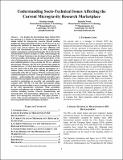| dc.contributor.author | Joseph, Christine | |
| dc.contributor.author | Wood, Danielle | |
| dc.date.accessioned | 2022-02-03T19:47:20Z | |
| dc.date.available | 2021-08-31T13:50:26Z | |
| dc.date.available | 2022-02-03T19:47:20Z | |
| dc.date.issued | 2019-06 | |
| dc.date.submitted | 2019-03 | |
| dc.identifier.isbn | 978-1-5386-6854-2 | |
| dc.identifier.uri | https://hdl.handle.net/1721.1/131219.2 | |
| dc.description.abstract | For decades, the International Space Station (ISS) has operated as a bastion of international cooperation and a unique testbed for microgravity research. Beyond enabling insights into human physiology in space, the ISS has served as a microgravity platform for numerous science experiments. In recent years, private industry has also been affiliating with NASA and international partners to offer transportation, logistics management, and payload demands. The Center for the Advancement of Science in Space (CASIS), which manages the ISS U.S. National Laboratory, has developed a diverse portfolio of private, public, international, and outreach projects. As the costs of flying projects to the ISS decrease, the barriers limiting non-traditional partners from accessing the ISS as a platform also decrease. However, the ISS in its current form cannot be sustained forever. As NASA looks towards commercialization of the low Earth orbit (LEO) space and the development of a cislunar station, concrete plans for shifting the public-private relationship of the ISS are unclear. With the consistent need to continue microgravity research - from governments and private industry - understanding the socio-technical and policy issues that affect the marketplace for future microgravity platforms is essential to maintaining an accessible and sustainable space economy. How will the U.S. and other governments design public-private partnerships to pursue economic and social goals in the LEO microgravity ecosystem? What governance structures will influence who is eligible to operate platforms for activities including tourism, research, manufacturing and outreach? How will international collaboration occur in the future LEO microgravity ecosystem? This paper presents a review of the current microgravity research ecosystem with a focus on potential future marketplace dynamics. | en_US |
| dc.language.iso | en | |
| dc.publisher | Institute of Electrical and Electronics Engineers (IEEE) | en_US |
| dc.relation.isversionof | http://dx.doi.org/10.1109/aero.2019.8742202 | en_US |
| dc.rights | Creative Commons Attribution-Noncommercial-Share Alike | en_US |
| dc.rights.uri | http://creativecommons.org/licenses/by-nc-sa/4.0/ | en_US |
| dc.source | Prof. Wood via Elizabeth Soergel | en_US |
| dc.title | Understanding Socio-Technical Issues Affecting the Current Microgravity Research Marketplace | en_US |
| dc.type | Article | en_US |
| dc.identifier.citation | Joseph, Christine and Danielle Wood. "Understanding Socio-Technical Issues Affecting the Current Microgravity Research Marketplace." 2019 IEEE Aerospace Conference, March 2019, Big Sky, Montana, USA, Institute of Electrical and Electronics Engineers, June 2019. © 2019 IEEE | en_US |
| dc.contributor.department | Massachusetts Institute of Technology. Department of Aeronautics and Astronautics | en_US |
| dc.relation.journal | 2019 IEEE Aerospace Conference | en_US |
| dc.eprint.version | Author's final manuscript | en_US |
| dc.type.uri | http://purl.org/eprint/type/ConferencePaper | en_US |
| eprint.status | http://purl.org/eprint/status/NonPeerReviewed | en_US |
| dc.date.updated | 2021-08-24T13:34:08Z | |
| dspace.orderedauthors | Joseph, C; Wood, D | en_US |
| dspace.date.submission | 2021-08-24T13:34:10Z | |
| mit.license | OPEN_ACCESS_POLICY | |
| mit.metadata.status | Authority Work Needed | en_US |
